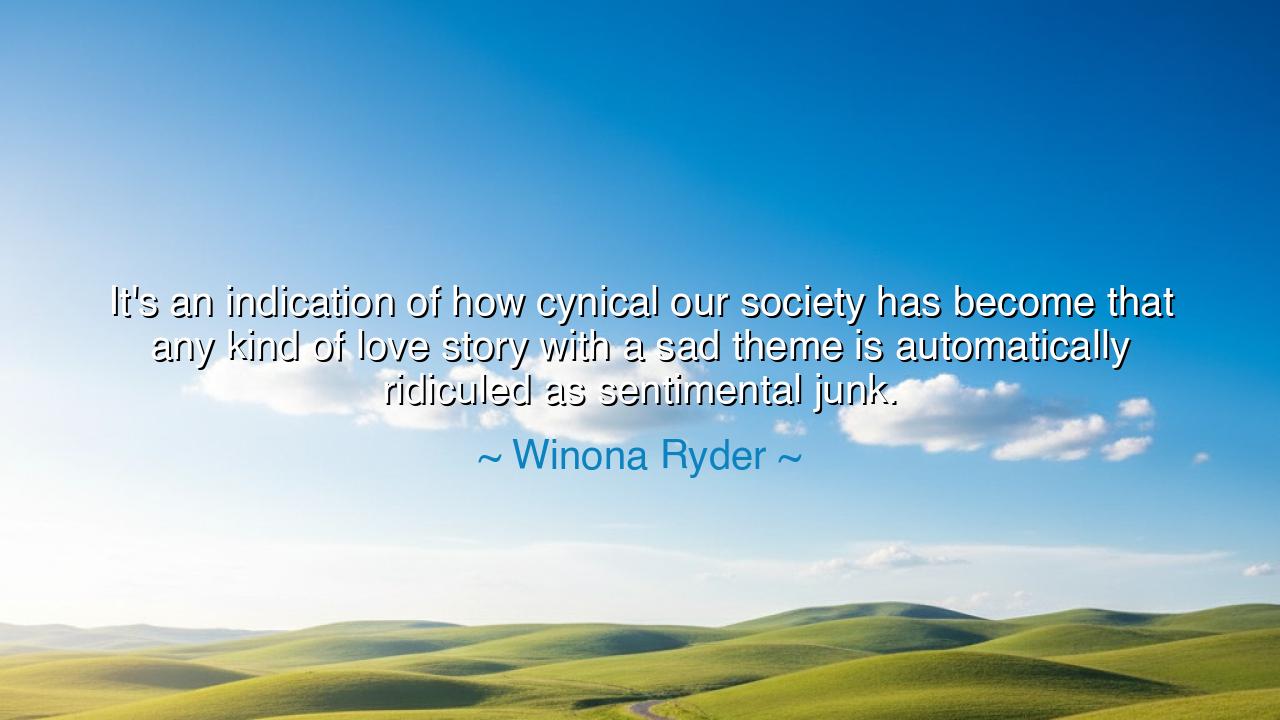
It's an indication of how cynical our society has become that any
It's an indication of how cynical our society has become that any kind of love story with a sad theme is automatically ridiculed as sentimental junk.






“It’s an indication of how cynical our society has become that any kind of love story with a sad theme is automatically ridiculed as sentimental junk.” — so spoke Winona Ryder, and her words pierce like an arrow into the heart of our age. For in them she reveals a truth both lamentable and urgent: that a world hardened by irony has forgotten how to weep honestly, how to honor the sacred beauty of sorrow mingled with love.
The ancients knew better. To them, the love story was not trifling entertainment but the mirror of the human soul. The songs of Orpheus, who descended into Hades for his beloved Eurydice, were woven not of laughter but of longing. His tale was steeped in sadness, yet it was revered, not mocked, for it captured the eternal tension between love and loss. The people of that time understood that sorrow, when born of love, was not weakness—it was the highest form of strength, a testament to the heart’s enduring fire.
Yet as Ryder laments, our society, intoxicated with cynicism, recoils from such truths. Where once a tale of love and loss would move audiences to tears, today it is too often dismissed as “sentimental junk.” We cloak ourselves in irony, fearing vulnerability, fearing that to weep is to be naive. And so the cynical spirit grows, hollowing out the noblest chambers of the soul.
Think of the story of Romeo and Juliet, told for centuries across tongues and nations. Their love was doomed, their ending sad, yet their tale has endured as one of the most powerful expressions of devotion. Imagine if Shakespeare had written it today and critics had laughed it away as sentimental. The tragedy of Verona would be silenced, and humanity would lose one of its greatest mirrors. For it is in such stories that we see ourselves—not our masks, not our cynicism, but our truest longing to love and be loved, even unto death.
The origin of Ryder’s lament lies in the decline of reverence for the emotional life. Where ancient people exalted poets and singers as guardians of the heart, our modern age often elevates sarcasm over sincerity, mockery over mourning. This shift has made us cautious of tenderness, fearful of being moved. Yet, as history shows, civilizations that scorn the language of the heart lose a vital part of their humanity. To strip away love stories is to strip away the very myths that give us courage and belonging.
The lesson is clear: let us not be ashamed of tears, nor scornful of stories that move us. Let us resist the temptation of cynicism, for it is easy to sneer but harder to feel deeply. To embrace the sad and the beautiful together is to honor the wholeness of life. We must guard against becoming a society that ridicules what is sacred, for to do so is to mock our own humanity.
Practical action must follow: seek out art, stories, and songs that stir the heart—even if they bring tears. Share them, honor them, let them remind you of the depths within you. When you hear another dismiss a tale of love as “sentimental,” stand firm and say: “No—this is truth clothed in sorrow.” In your own life, speak words of affection freely, write letters, tell your story without fear of ridicule. For every act of sincerity is a blow struck against the empire of cynicism.
Thus Winona Ryder’s words remain not merely a criticism, but a summons. They call us back to reverence, back to the beauty of the love story, back to the courage of embracing what is sad without shame. Let us remember what the ancients knew: that the mingling of love and sorrow is not junk—it is the very essence of being human. And in cherishing it, we reclaim the power to feel, to connect, and to live deeply once more.






AAdministratorAdministrator
Welcome, honored guests. Please leave a comment, we will respond soon